The new Agri-Climate Rural Environment Scheme (ACRES) could well lead to environmental decline in the Burren, one of the founders of the Burren Programme has said.
Speaking to the Irish Farmers Journal, Brendan Dunford said that given the current structure of ACRES, all of the gains made over the last 13 years could gradually be lost.
“That’s the first concern, but for farmers and ourselves there’s a concern that they’ll be getting less payments. Most of our farmers would be getting €4,000 to €5,000 from GLAS, but in addition they would have been getting €3,500 from us for the results-based payment.
“Some farmers with bigger holdings and high-quality land were getting up to €10,000. That was the most that anybody got from us, so a farmer like that would be getting €15,000. Now they’re back to €7,000.
“The average farmer would be going from €8,500 back to €7,000 if you look at it as the Burren Programme plus GLAS compared to the results-based payment under ACRES. We feel that paying farmers to deliver these outcomes is a really good investment, we don’t see it as compensation, so if you’re delivering more, let’s pay more.
“At a time where we should be showing huge environmental ambition, we unfortunately seem to be showing a little bit less,” he said.
Dunford and his colleague Sharon Parr have stepped away from the BurrenAran ACRES co-operation project as he “can’t stand over” the new scheme.
BurrenAran will succeed the Burren Programme, which has been operational for the last 13 years.
The programme covered about 70% of the Burren landscape where scheme co-ordinators worked hand in hand with farmers, rewarding them for delivering good environmental outcomes and supporting them with advice and funding for conservation action.
“Every single year of its operation, it showed a quantifiable positive environmental outcome.
“The Burren Programme is CAP-funded so it is coming to its natural end later this year, 31 December, and it will be no more. The ACRES co-operation project for the Burren, Aran and west Galway will be the new programme for the region so farmers won’t have access to GLAS or the Burren Programme, they’ll only have access to ACRES.”
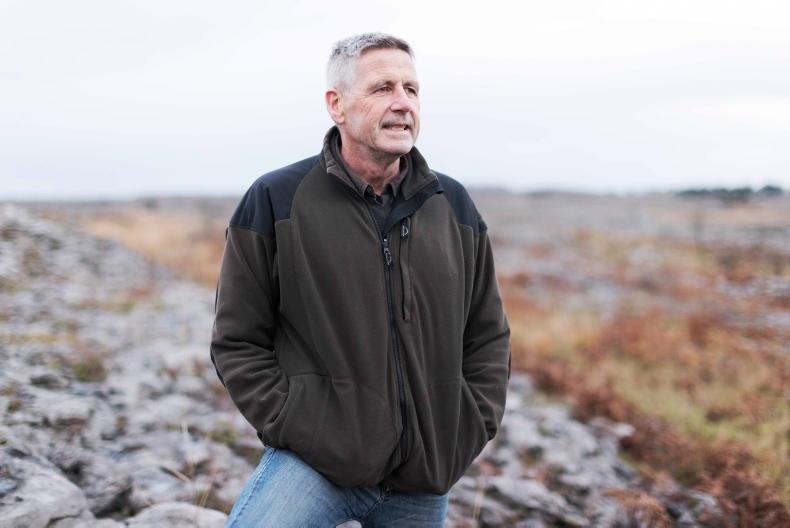
Brendan Dunford. \ Eamon Ward
One of the issues which resulted in Dunford walking away from the project, which his company successfully tendered for, is around the field scoring aspect of results-based payments.
“The new programme, for instance, has a measure around paying farmers for field scores, which we did previously, but we did it in a very different way in terms of the payment structure. For us, results-based payments meant the more you delivered, the more you got paid and we used something called banded payments to make sure that every field you were delivering on was actually getting paid.
“With the new ACRES you have a results-based payment but you have a ceiling on it. So, theoretically, if you have a ceiling it doesn’t matter what you do beyond that. That for us is a concern that it will result in some of our larger farms getting the full payment for managing one or two of the fields and neglecting some of the others.”
Dunford said that a typical farm in the Burren could be 50ha. “So if you look at that 50ha, you can draw down your full €7,000 by managing 23ha of it. The question is what happens to the other 27ha?
We can’t run this because we basically can’t stand over a reversal of the environmental gains accumulated over the years
“OK, you won’t be allowed to damage it but you can decide to relax the grazing and maybe take it a little bit easier in terms of scrub management and you still get your €7,000.
“On that land, there could be less and less management but the payment won’t change, so the incentive to manage every field and keep it in as best a condition as possible… that incentive is less than what it used to be,” he said.
“We can’t run this because we basically can’t stand over a reversal of the environmental gains accumulated over the years. That’s just how we felt and respectfully to the Department they have a difficult job as well, but we decided that we had to withdraw.”
Irresponsible
“We decided as a team it would be irresponsible for us to walk away because it might jeopardise farmer payments and it might further jeopardise the environmental gains so we went back in to run it. But myself and Sharon decided at that point to step back from it, because we couldn’t stand over it in front of our farmers,” he said.
“We had to push so hard and in fairness to farmers they put up with us for the last 13 years. We had to push so hard for the gains we got, so any relaxation of that push you’d imagine would result in environmental decline.”
ACRES ‘just not ambitious enough in what we need’
Dunford said that, for him, ACRES is good but it’s “just not ambitious enough for what we need”.
“We should be building, we should be compromising, we should be trying to do more. It’s making sure that there are more outcomes delivered for water quality, for climate and I think that’s my regret with ACRES.
“It’s good in some ways but it needs to be great,” he said.
‘No point in being critical’
“There’s no point in being critical of people, it’s not a simple job to do to keep everybody happy but I just think we should be way more ambitious,” Dunford stated, adding that the next CAP may be a missed opportunity.
He admitted that he has found “the last six months immensely frustrating because we know what can be done and what needs to be done and we’re not doing it, that’s frustrating. So that has certainly taken a personal toll. I’m running out of fumes because I think it’s worth fighting for,” he added.
However, he believes one of the really good things about ACRES is the local co-operation project teams.
Results-based payments
“I think that’s really something to be commended. The principle of results-based payments is great, because it gives farmers an incentive, it’s just the payment structure around it is flawed.
“Don’t judge a scheme by the number of participants. It’s the agri-environmental outcomes we should judge them on,” he said.
Following a meeting with Ministers for Agriculture Charlie McConalogue and Pippa Hackett this week, the Department of Agriculture said that Department officials have been working with the Burren co-operation project team to develop a bespoke bonus payment structure to achieve this aim, and reward such farmers to maintain their land at a high environmental level, thereby prevent backsliding or environmental decline.
Lyons or Barry’s?
Barry’s.
Favourite book?
A Shepherd’s Life by James Rebanks.
Favourite film?
The Field.
Hobbies?
Hurling and
photography.
The new Agri-Climate Rural Environment Scheme (ACRES) could well lead to environmental decline in the Burren, one of the founders of the Burren Programme has said.
Speaking to the Irish Farmers Journal, Brendan Dunford said that given the current structure of ACRES, all of the gains made over the last 13 years could gradually be lost.
“That’s the first concern, but for farmers and ourselves there’s a concern that they’ll be getting less payments. Most of our farmers would be getting €4,000 to €5,000 from GLAS, but in addition they would have been getting €3,500 from us for the results-based payment.
“Some farmers with bigger holdings and high-quality land were getting up to €10,000. That was the most that anybody got from us, so a farmer like that would be getting €15,000. Now they’re back to €7,000.
“The average farmer would be going from €8,500 back to €7,000 if you look at it as the Burren Programme plus GLAS compared to the results-based payment under ACRES. We feel that paying farmers to deliver these outcomes is a really good investment, we don’t see it as compensation, so if you’re delivering more, let’s pay more.
“At a time where we should be showing huge environmental ambition, we unfortunately seem to be showing a little bit less,” he said.
Dunford and his colleague Sharon Parr have stepped away from the BurrenAran ACRES co-operation project as he “can’t stand over” the new scheme.
BurrenAran will succeed the Burren Programme, which has been operational for the last 13 years.
The programme covered about 70% of the Burren landscape where scheme co-ordinators worked hand in hand with farmers, rewarding them for delivering good environmental outcomes and supporting them with advice and funding for conservation action.
“Every single year of its operation, it showed a quantifiable positive environmental outcome.
“The Burren Programme is CAP-funded so it is coming to its natural end later this year, 31 December, and it will be no more. The ACRES co-operation project for the Burren, Aran and west Galway will be the new programme for the region so farmers won’t have access to GLAS or the Burren Programme, they’ll only have access to ACRES.”

Brendan Dunford. \ Eamon Ward
One of the issues which resulted in Dunford walking away from the project, which his company successfully tendered for, is around the field scoring aspect of results-based payments.
“The new programme, for instance, has a measure around paying farmers for field scores, which we did previously, but we did it in a very different way in terms of the payment structure. For us, results-based payments meant the more you delivered, the more you got paid and we used something called banded payments to make sure that every field you were delivering on was actually getting paid.
“With the new ACRES you have a results-based payment but you have a ceiling on it. So, theoretically, if you have a ceiling it doesn’t matter what you do beyond that. That for us is a concern that it will result in some of our larger farms getting the full payment for managing one or two of the fields and neglecting some of the others.”
Dunford said that a typical farm in the Burren could be 50ha. “So if you look at that 50ha, you can draw down your full €7,000 by managing 23ha of it. The question is what happens to the other 27ha?
We can’t run this because we basically can’t stand over a reversal of the environmental gains accumulated over the years
“OK, you won’t be allowed to damage it but you can decide to relax the grazing and maybe take it a little bit easier in terms of scrub management and you still get your €7,000.
“On that land, there could be less and less management but the payment won’t change, so the incentive to manage every field and keep it in as best a condition as possible… that incentive is less than what it used to be,” he said.
“We can’t run this because we basically can’t stand over a reversal of the environmental gains accumulated over the years. That’s just how we felt and respectfully to the Department they have a difficult job as well, but we decided that we had to withdraw.”
Irresponsible
“We decided as a team it would be irresponsible for us to walk away because it might jeopardise farmer payments and it might further jeopardise the environmental gains so we went back in to run it. But myself and Sharon decided at that point to step back from it, because we couldn’t stand over it in front of our farmers,” he said.
“We had to push so hard and in fairness to farmers they put up with us for the last 13 years. We had to push so hard for the gains we got, so any relaxation of that push you’d imagine would result in environmental decline.”
ACRES ‘just not ambitious enough in what we need’
Dunford said that, for him, ACRES is good but it’s “just not ambitious enough for what we need”.
“We should be building, we should be compromising, we should be trying to do more. It’s making sure that there are more outcomes delivered for water quality, for climate and I think that’s my regret with ACRES.
“It’s good in some ways but it needs to be great,” he said.
‘No point in being critical’
“There’s no point in being critical of people, it’s not a simple job to do to keep everybody happy but I just think we should be way more ambitious,” Dunford stated, adding that the next CAP may be a missed opportunity.
He admitted that he has found “the last six months immensely frustrating because we know what can be done and what needs to be done and we’re not doing it, that’s frustrating. So that has certainly taken a personal toll. I’m running out of fumes because I think it’s worth fighting for,” he added.
However, he believes one of the really good things about ACRES is the local co-operation project teams.
Results-based payments
“I think that’s really something to be commended. The principle of results-based payments is great, because it gives farmers an incentive, it’s just the payment structure around it is flawed.
“Don’t judge a scheme by the number of participants. It’s the agri-environmental outcomes we should judge them on,” he said.
Following a meeting with Ministers for Agriculture Charlie McConalogue and Pippa Hackett this week, the Department of Agriculture said that Department officials have been working with the Burren co-operation project team to develop a bespoke bonus payment structure to achieve this aim, and reward such farmers to maintain their land at a high environmental level, thereby prevent backsliding or environmental decline.
Lyons or Barry’s?
Barry’s.
Favourite book?
A Shepherd’s Life by James Rebanks.
Favourite film?
The Field.
Hobbies?
Hurling and
photography.





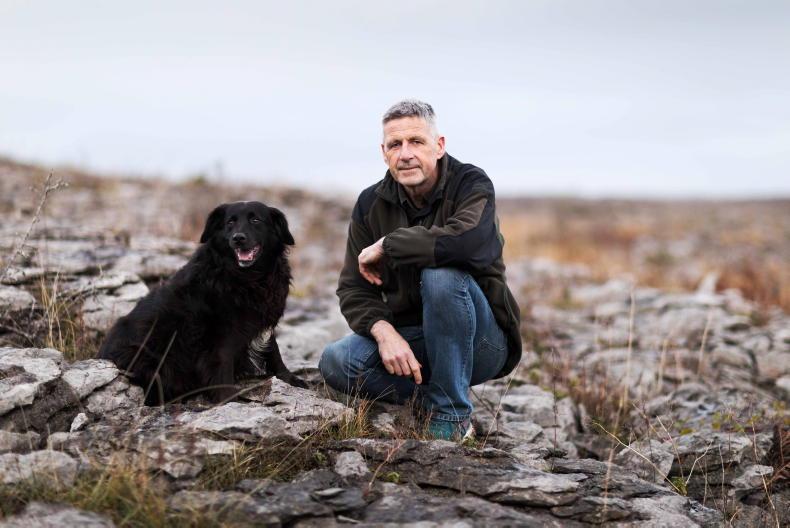
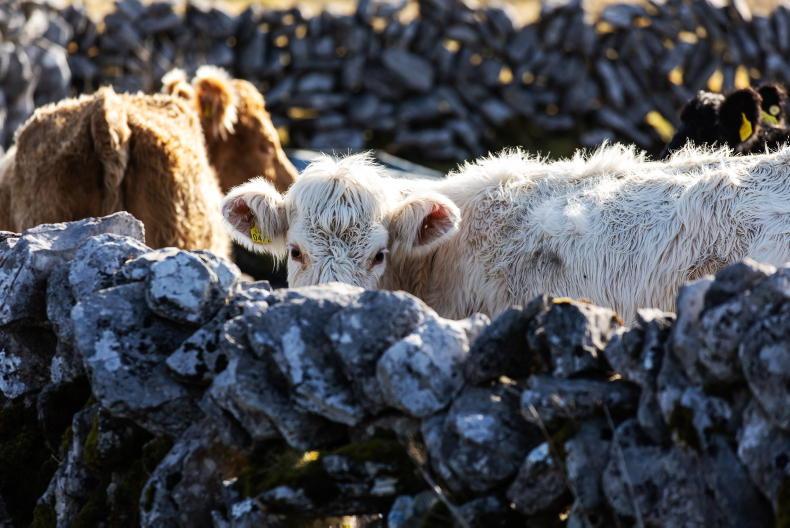


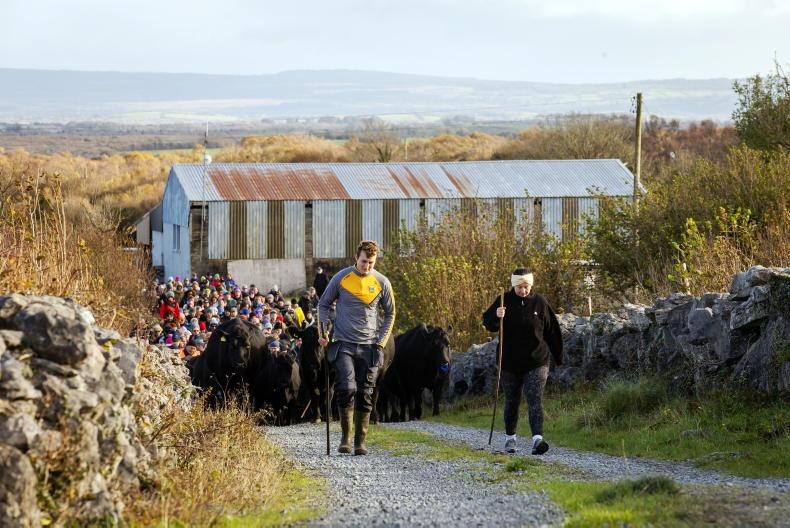
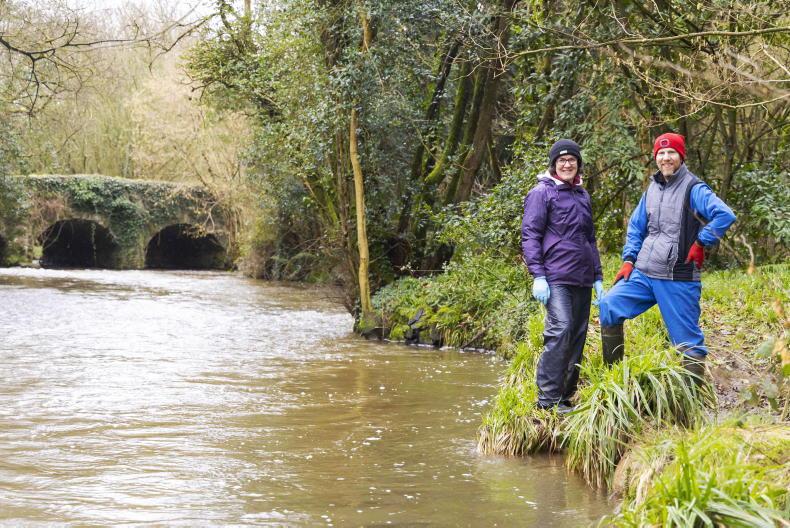
SHARING OPTIONS